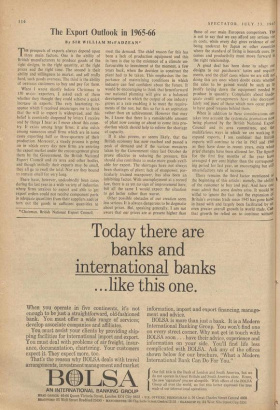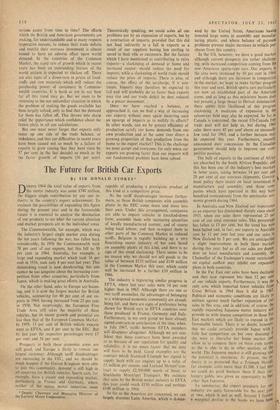The Export Outlook in 1965-66
By SIR WILLIAM McFADZEAN•
THE prospects of exports always depend upon three main factors. One is the ability of British manufacturers to produce goods of the right designs, in the right quantity, at the right prices and the right time. The second is their ability and willingness to market, and sell really hard, such goods overseas. The third is the ability of overseas customers to buy and pay for them.
When I wrote shortly before Christmas to 150 major exporters, I asked each of them whether they thought they could achieve a quick increase in exports. The very heartening re- sponse which I received encourages me to think that the will to export is widespread, and this belief is constantly deepened by letters I receive and by things I hear as I move about this coun- try. It exists among large firms; it also exists among numerous small firms which are in some cases exporting half or three-quarters of their production. Moreover, a steady process is going on in which every day new firms are entering the export market under the encouragement given them by the Government, the British National Export Council and its area and other bodies, and though initially their exports may be small, they all go to swell the total. Nor are they bound to remain small for very long.
There have, however, undoubtedly been cases during the last year in a wide variety of industries where firms anxious to export and able to "get export orders could not receive component parts in adequate quantities from their suppliers and/or turn out the goods in sufficient quantities to * Chairman, British National Export Council. meet the demand. The chief reason for this has been a lack of production equipment and this in turn is due to the existence of a climate un- favourable to investment at the moment, a few years back, when the decision to construct the plant had to be taken. This emphasises the im- portance of maintaining conditions in which industry can feel confident about the future. It would be encouraging to think that henceforward our national planning will give us a balanced development in which the output of one industry grows at a rate enabling it to meet the require- ments of the rest, but this so far is an aspiration rather than an achievement. However that may be, I know that there is a considerable amount of plant now coming or about to come into pro- duction which should help to relieve the shortage of capacity.
If it also proves, as seems likely, that the British economy has now reached and passed a peak of demand and if the various measures taken by the Government since last October do prove effective in reducing the pressure, this should also contribute to make more goods avail- able for export. The shortages have not always been shortages of plant; lack of manpower, par- ticularly trained manpower, has also been an inhibiting factor. With unemployment at a record low, there is as yet no sign of improvement here, but all the same I would expect the situation to get better rather than worse.
Other possible obstacles of our creation seem less serious. It is always dangerous to be dogmatic about prices. But, speaking generally, I am not aware that our prices are at present higher than
those of our main European competitors. This is not to say that we can afford any serious rise in costs, while every daj, gives evidence of out being undercut by Japan or other countries where the standard of living is beneath ours. In comes and productivity must move forward 10 the right relationship.
A groat deal has been done to adapt our designs to our purchasers' tastes and require' ments, and the chief cases where we are still not doing this are ones where doubt exists whether the sales to be gained would be such as to justify laying down the equipment needed to produce in quantity. Complaints about inade' quate credit arrangements have also decreased lately and most of those which now occur prove to have good reasons behind them.
When in addition to these considerations one takes into account the systematic promotion noW being planned by the British National Export Council and its area committees, and the multifarious ways in which we are working 10 expand exports, I am confident that British exports will continue to rise in 1965 and 1966 as they have done in recent years, even when price'changes have been allowed for. The figures for the first five months of the year have averaged 4 per cent higher than the correspond- ing period for last year, an encouraging but still unsatisfactory rate of increase.
There remains the third factor mentioned at the beginning of this article; namely, the ability of the customer to buy and pay. And here one must admit that some doubts arise. It would he wilful to ignore the fact that the expansion of Britain's overseas trade since 1945 has gone hand in hand with and largely been facilitated by all even greater overall growth in world trade. Can that growth be relied on to continue without
serious pause from time to time? The efforts which the British and American governments are making, for understandable and in many respects imperative reasons, to reduce their trade deficits and restrict their overseas investment is almost bound to have an adverse effect upon world demand. In the countries of the Common Market, the rapid rate of growth which in recent years has been an outstanding feature of the world picture is expected to slacken off. There are also signs of a down-turn in prices of food- stuffs and raw materials which will reduce the purchasing power of customers in Common- wealth countries. It is hard as yet to say how far all this trend may go. But we seem to be returning to the not unfamiliar situation in which the problem of making the goods available has been largely Solved, only to find that the demand for them has fallen off. This throws into sharp rehief the importance which confidence about the future plays in.all our calculations.
But one must never forget that exports only make up one side of the trade balance, or imbalance, and that our difficulties in recent years have been caused not so much by a failure of exports to grow (seeing that they have risen by 37 per cent in the last decade) so much as by the faster growth of imports (56 per cent). Theoretically speaking, we could solve all our problems not by an expansion of exports, but by a contraction of imports, provided that this did not lead indirectly to a fall in exports as a result of our suppliers having less sterling to spend in their role as customers. But the factors which I have mentioned as contributing to extra exports—a slackening of demand at home and increased output—should reduce the need for imports, while a slackening of world trade should reduce the price of imports. There is also, of course, the effect of the surcharge, if it con- tinues. Imports may therefore be expected to fall and will probably do so faster than exports may rise and our trade deficit be thus reduced by a pincer movement.
Once we have reached a balance, or approached it, can we find a way of increasing our exports without once again incurring such an upsurge of imports as to nullify its effects? In other words, can we by greater efficiency of production satisfy our home demands from our own production and at the same time divert a growing proportion of that production from the home to the export market? This is the challenge we must accept and overcome, for only when our exports are growing faster than our imports will our fundamental problem have been solved.















































 Previous page
Previous page